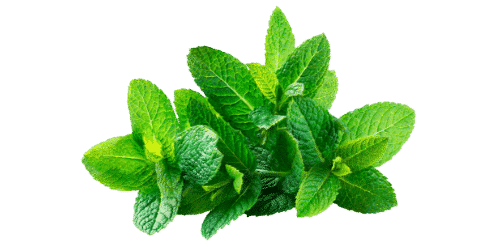
Origin
The different varieties of mint have been used by numerous populations since ancient times. Peppermint has been found for example in various Egyptian pyramids dating back to the first millenium B:C: Although initially naturalists believed that it developed in damp environments, they finally realised that it is the result quite simply of natural hybridization between two other varieties of mint. It wasn’t until the 18th century that peppermint became popular in Europe, valued for its multiple virtues.
Did you know?
The name mint is derived from Mintha, the name of a nymph who was turned into this plant by the jealous wife of the god of the underworld so that she could no longer seduce him with her fragrance.
Characteristics
Peppermint is a perennial plant that grows up to around 60 cm in height. It has a quadrangular stem and pointed, serrated leaves. Its flowers, which are purple in colour, are arranged in tight whorls. It is the leaves that are used in phytotherapy. They can be consumed in herbal tea form, or in essential oil form.
Flowering and harvesting
Peppermint grows in cooler soil temperatures, in locations that receive some sunlight but not too much. The harvesting of the leaves is carried out at the start of flowering, in summer, when their aromatic qualities are at their peak. The leaves can be consumed fresh in herbal tea or dried and turned into essential oil.
Benefits
Peppermint contains various substances: phenolic acids, flavonoids, tannins, menthol, menthone and menthyl acetate. However, its composition can vary according to weather conditions.1
It helps to:
- Aid digestion1
Essential oil of mint has the power to aid digestion and helps to prevent mild digestive disorders such as bloating or flatulence.
- Relieve the respiratory tract1
This essential oil contributes to the healthy functioning of the respiratory tract and provides relief in the event of a cold, for example.
- Contribute to physical well-being1
Lastly, essential oil of peppermint contributes to physical well-being and in particular helps the body to resist micro-organisms that are harmful for the health.
1Plant-based health: 200 plants with health benefits Reader’s Digest selection, 2003. 352 p. ISBN 2-7098-1413-7
